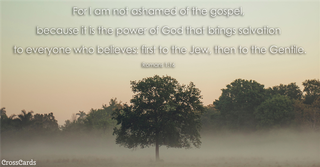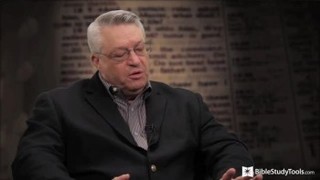- Recent Translations
- All Translations
Romans 1
Share
Settings
Videos for Romans 1
Romans 1 Commentary
Chapter 1
The scope or design of the apostle in writing to the Romans appears to have been, to answer the unbelieving, and to teach the believing Jew; to confirm the Christian and to convert the idolatrous Gentile; and to show the Gentile convert as equal with the Jewish, in respect of his religious condition, and his rank in the Divine favour. These several designs are brought into on view, by opposing or arguing with the infidel or unbelieving Jew, in favour of the Christian or believing Gentile. The way of a sinner's acceptance with God, or justification in his sight, merely by grace, through faith in the righteousness of Christ, without distinction of nations, is plainly stated. This doctrine is cleared from the objections raised by Judaizing Christians, who were for making terms of acceptance with God by a mixture of the law and the gospel, and for shutting out the Gentiles from any share in the blessings of salvation brought in by the Messiah. In the conclusion, holiness is further enforced by practical exhortations.
The apostle's commission. (1-7) Prays for the saints at Rome, and expresses his desire to see them. (8-15) The gospel way of justification by faith, for Jews and Gentiles. (16,17) The sins of the Gentiles set forth. (18-32)
Verses 1-7 The doctrine of which the apostle Paul wrote, set forth the fulfilment of the promises by the prophets. It spoke of the Son of God, even Jesus the Saviour, the promised Messiah, who came from David as to his human nature, but was also declared to be the Son of God, by the Divine power which raised him from the dead. The Christian profession does not consist in a notional knowledge or a bare assent, much less in perverse disputings, but in obedience. And all those, and those only, are brought to obedience of the faith, who are effectually called of Jesus Christ. Here is, 1. The privilege of Christians; they are beloved of God, and are members of that body which is beloved. 2. The duty of Christians; to be holy, hereunto are they called, called to be saints. These the apostle saluted, by wishing them grace to sanctify their souls, and peace to comfort their hearts, as springing from the free mercy of God, the reconciled Father of all believers, and coming to them through the Lord Jesus Christ.
Verses 8-15 We must show love for our friends, not only by praying for them, but by praising God for them. As in our purposes, so in our desires, we must remember to say, If the Lord will, Jas. 4:15 . Our journeys are made prosperous or otherwise, according to the will of God. We should readily impart to others what God has trusted to us, rejoicing to make others joyful, especially taking pleasure in communing with those who believe the same things with us. If redeemed by the blood, and converted by the grace of the Lord Jesus, we are altogether his; and for his sake we are debtors to all men, to do all the good we can. Such services are our duty.
Verses 16-17 In these verses the apostle opens the design of the whole epistle, in which he brings forward a charge of sinfulness against all flesh; declares the only method of deliverance from condemnation, by faith in the mercy of God, through Jesus Christ; and then builds upon it purity of heart, grateful obedience, and earnest desires to improve in all those Christian graces and tempers, which nothing but a lively faith in Christ can bring forth. God is a just and holy God, and we are guilty sinners. It is necessary that we have a righteousness to appear in before him: there is such a righteousness brought in by the Messiah, and made known in the gospel; a gracious method of acceptance, notwithstanding the guilt of our sins. It is the righteousness of Christ, who is God, coming from a satisfaction of infinite value. Faith is all in all, both in the beginning and progress of Christian life. It is not from faith to works, as if faith put us into a justified state, and then works kept us in it; but it is all along from faith to faith; it is faith pressing forward, and gaining the victory over unbelief.
Verses 18-25 The apostle begins to show that all mankind need the salvation of the gospel, because none could obtain the favour of God, or escape his wrath by their own works. For no man can plead that he has fulfilled all his obligations to God and to his neighbour; nor can any truly say that he has fully acted up to the light afforded him. The sinfulness of man is described as ungodliness against the laws of the first table, and unrighteousness against those of the second. The cause of that sinfulness is holding the truth in unrighteousness. All, more or less, do what they know to be wrong, and omit what they know to be right, so that the plea of ignorance cannot be allowed from any. Our Creator's invisible power and Godhead are so clearly shown in the works he has made, that even idolaters and wicked Gentiles are left without excuse. They foolishly followed idolatry; and rational creatures changed the worship of the glorious Creator, for that of brutes, reptiles, and senseless images. They wandered from God, till all traces of true religion must have been lost, had not the revelation of the gospel prevented it. For whatever may be pretended, as to the sufficiency of man's reason to discover Divine truth and moral obligation, or to govern the practice aright, facts cannot be denied. And these plainly show that men have dishonoured God by the most absurd idolatries and superstitions; and have degraded themselves by the vilest affections and most abominable deeds.
Verses 26-32 In the horrid depravity of the heathen, the truth of our Lord's words was shown: "Light was come into the world, but men loved darkness rather than light, because their deeds were evil; for he that doeth evil hateth the light." The truth was not to their taste. And we all know how soon a man will contrive, against the strongest evidence, to reason himself out of the belief of what he dislikes. But a man cannot be brought to greater slavery than to be given up to his own lusts. As the Gentiles did not like to keep God in their knowledge, they committed crimes wholly against reason and their own welfare. The nature of man, whether pagan or Christian, is still the same; and the charges of the apostle apply more or less to the state and character of men at all times, till they are brought to full submission to the faith of Christ, and renewed by Divine power. There never yet was a man, who had not reason to lament his strong corruptions, and his secret dislike to the will of God. Therefore this chapter is a call to self-examination, the end of which should be, a deep conviction of sin, and of the necessity of deliverance from a state of condemnation.
Romans 1 Commentaries
Chapter Summary
INTRODUCTION TO ROMANS
Though this epistle is in order placed the first of the epistles, yet it was not first written: there were several epistles written before it, as the two epistles to the Thessalonians, the two to the Corinthians, the first epistle to Timothy, and that to Titus: the reason why this epistle stands first, is either the excellency of it, of which Chrysostom had so great an esteem that he caused it to be read over to him twice a week; or else the dignity of the place, where the persons lived to whom it is written, being Rome, the imperial city: so the books of the prophets are not placed in the same order in which they were written: Hosea prophesied as early as Isaiah, if not earlier; and before Jeremiah and Ezekiel, and yet stands after them. This epistle was written from Corinth, as the subscription of it testifies; and which may be confirmed from the apostle's commendation of Phoebe, by whom he sent it, who was of Cenchrea, a place near Corinth; by his calling Erastus, the chamberlain of the city, who abode at Corinth, 2Ti 4:20, and Gaius his host, who was a Corinthian, Ro 16:23 1Co 1:14, though at what time it was written from hence, is not so evident: some think it was written in the time of his three months' travel through Greece, Ac 20:2,3, a little before the death of the Emperor Claudius, in the year of Christ 55; others, that it was written by him in the short stay he made at Corinth, when he came thither, as is supposed, from Philippi, in his way to Troas, where some of his company went before, and had been there five days before him: and this is placed in the second year of Nero, and in the year of Christ 56; however, it was not written by him during his long stay at Corinth, when he was first there, but afterwards, even after he had preached from Jerusalem, and round about unto Illyricum: and when he was about to go to Jerusalem, with the contributions of the churches of Macedonia and Achaia, to the poor saints there, Ro 15:19,25,26. The persons to whom this epistle was sent were Roman saints, both Jews and Gentiles, inhabiting the city of Rome; of which city and church; \\see Gill on "Ac 28:14"\\; \\see Gill on "Ac 28:15"\\; by whom the Gospel was first preached at Rome, and who were the means of forming the church there, is not very evident Irenaeus, an ancient writer, says {a}, that Peter and Paul preached the Gospel at Rome, and founded the church; and Gaius, an ecclesiastical man, who lived in the time of Zephyrinus, bishop of Rome, asserts the same; and Dionysius; bishop of the Corinthians, calls the Romans the plantation of Peter and Paul {b}: whether Peter was ever at Rome is not a clear point with many; and certain it is, that the Apostle Paul had not been at Rome when he wrote this epistle, at least it seems very probable he had not, by several expressions in Ro 1:10-15; and yet here was a church to which he writes, and had been a considerable time; for their faith was spoken of throughout the world, Ro 1:8; and when the apostle was on the road to this city, the brethren in it met him, Ac 28:15. The chief design of this epistle is to set in a clear light the doctrine of justification: showing against the Gentiles, that it is not by the light of nature, and works done in obedience to that, and against the Jews, that it was not by the law of Moses, and the deeds of that; which he clearly evinces, by observing the sinful and wretched estate both of Jews and Gentiles: but that it is by the righteousness of Christ imputed through the grace of God, and received by faith; the effects of which are peace and joy in the soul, and holiness in the life and conversation: he gives an account of the justified ones, as that they are not without sin, which he illustrates by his own experience and case; and yet are possessed of various privileges, as freedom from condemnation, the blessing of adoption, and a right to the heavenly inheritance; he treats in it concerning predestination, the calling of the Gentiles, and the rejection of the Jews; and exhorts to the various duties incumbent on the saints, with respect to one another, and to the world, to duties of a moral and civil nature, and the use of things indifferent; and closes it with the salutations of divers persons.
{a} Adv. Haeres. l. 3. c. 1. Vid. Euseb. Eccl. Hist. l. 5. c. 8. {b} Apud Euseb. Eccl. Hist. l. 2. c. 25.
\\INTRODUCTION TO ROMANS 1\\
This chapter contains the inscription of the epistle, and salutation, the preface to it, and the grand proposition of justification by faith, so much enlarged on afterwards; and that this could not be by the law of nature, and the works of it among the Gentiles, is demonstrated by a detail of their horrible wickedness, impiety, and unrighteousness. In the inscription an account is given of the author of the epistle, who is described in Ro 1:1 by his name Paul: by his relation to Christ, a servant of his; and by his office, an apostle, whose business and concern were with the Gospel; to which he was separated. This Gospel is commended from the author of it, who is God himself; and from the antiquity of it, Ro 1:2,3, being as ancient as the writings of the prophets; and from the subject of it, being the Lord Jesus Christ; who is described by his relation to God, his Son, by his dominion over the saints, their Lord, by both his natures, human and divine; his human nature, as being of the seed of David, his divine nature, being the Son of God, Ro 1:4, which is declared by the power he is possessed of, by the Spirit of holiness that is in him, by his resurrection from the dead, and by the apostles receiving from him grace to fit them for their office, and by the office itself: the end of which was to make some among all nations obedient to him, Ro 1:5, among whom were the saints at Rome, who were called by him, and after his name, Ro 1:6, which introduces the account of the persons to whom this epistle is written, who are described, Ro 1:7, by the place of their abode, Rome; by their interest in the love of God; and by the effect, fruit, and evidence of it, their effectual calling; and then follows the apostle's usual salutation, as in all his epistles, in which he wishes grace and peace for them, from God the Father, and from Christ. The preface begins Ro 1:8, in which are a thanksgiving to God, through Christ, for all the saints at Rome, particularly on account of their faith, for which they were everywhere so famous; an appeal to God, Ro 1:9, for the truth of his incessant prayers for them, and particularly, Ro 1:10, that this was a request he made, that if it was the will of God, he might have a speedy and prosperous journey to, them; an expression of strong affection to them, and of his great desire to see them, Ro 1:11, his end in which was partly for their sakes, to communicate spiritual things to them for their establishment, and partly for his own comfort, and the increase of the mutual faith of both, Ro 1:12, also a vindication of himself, Ro 1:13, showing, that it was not any fault of his, or any neglect of them by him, that he had not been with them as yet, but some things hindered him, in the execution of his purpose to come to them; to which he was moved, partly by the hope of having fruit among them, as among others, and partly through the obligation that lay upon him by virtue of his office, to preach the Gospel to all sorts of men, Ro 1:14, he expresses his willingness and readiness to preach the Gospel to them at Rome, as soon as an opportunity would offer, Ro 1:15, which was his work and office, what he delighted in, was closely attached to, and by no means ashamed of, Ro 1:16, partly because of the nature of it, it was the Gospel, good news and true: and partly because of the author and subject of it, Christ; as also because of the efficacy of it in the salvation of Jews and Gentiles; and likewise because of a principal doctrine revealed in it, Ro 1:17, the doctrine of justification by faith, in the righteousness of Christ, confirmed and illustrated by a passage out of Hab 2:4, and which he particularly mentions, because he intended to dwell upon it in this epistle: and in order to show that the Gentiles could not be justified in the sight of God by their obedience to the law, and the light of nature, he observes, that they were the objects of the wrath of God, Ro 1:18, and that very justly, because they sinned knowingly; they had some knowledge of the truth, but they would not profess it: and that they had such knowledge of it, he proves from the author of it, God, who showed it to them, Ro 1:19, and from the means of it, by which they must, and did arrive to some degree of it, namely, the works of creation, Ro 1:20. The apostle goes on to expose the ingratitude of them, the vanity of their minds, the pride and folly of their hearts, Ro 1:21,22, the gross idolatry they were guilty of, Ro 1:23, for which idolatry they were given up to their own hearts' lusts, to commit the foulest and most scandalous iniquities, even to commit sodomitical practices, and unnatural lusts, both men and women, Ro 1:24-28. And so far were they from having a righteousness to justify them before God, that they were titled with all unrighteousness; and a large list of the vilest sins, being committed by them, is given; and a catalogue of the worst of sinners, as among them, Ro 1:29-32. All which are aggravated by their knowledge of the will of God, through the light of nature, that these things were contrary to it, and were deserving of death; and yet they both did them, and were delighted with those that committed them also: the inference which he leaves to be deduced from hence, and which may easily be deduced, is, that therefore there can be no justification of such persons in the sight of God by their own works.



